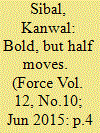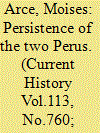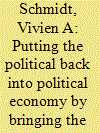|
|
|
Sort Order |
|
|
|
Items / Page
|
|
|
|
|
|
|
| Srl | Item |
| 1 |
ID:
138637


|
|
|
|
|
| Summary/Abstract |
During his China visit, Prime Minister Narendra Modi’s unusual candour in speaking about the problems that hold back the India-China relationship is a refreshing change from the past discourse of emphasising only improved border management and acceptance that the border issue will take a long time to resolve and should not impede the rest of the relationship from moving forward.
|
|
|
|
|
|
|
|
|
|
|
|
|
|
|
|
| 2 |
ID:
127604


|
|
|
|
|
| Publication |
2014.
|
| Summary/Abstract |
Peru is poised for a brighter future. Since Alberto Fujimori's decade-long presidency ended in 2000, politics has become more liberalized, and the press livelier and freer. At the same time, the country has embarked on an important process of decentralization, allowing newly created regional governments a greater role in public policy, thus placing constraints on executive power. The extraction of natural resources, following the economic liberalization policies of the Fujimori era, has contributed to an impressive economic expansion, aided by record-high commodity prices and the growing Chinese demand for raw materials.
|
|
|
|
|
|
|
|
|
|
|
|
|
|
|
|
| 3 |
ID:
088899


|
|
|
|
|
| Publication |
2009.
|
| Summary/Abstract |
Dominant theoretical approaches in political economy today, whether they posit convergence to neoliberal capitalism, binary divergence of capitalisms, or tripartite differentiation of financial governance, downplay the importance of state action. Their methodological approaches, rational choice and historical institutionalism, tend to reinforce their substantive theories either by disaggregating the state into its historical institutional components or by focusing on the strategic actions of its rational actors. This article argues that by not taking state action seriously, they are unable to explain the differences in degree and kind of countries' neoliberal reforms. For this, it is necessary to bring the state back in and to put the political back into political economy not just in terms of political economic institutions but also in terms of policies, polity, and politics. To explore the political in all its variety, however, the article demonstrates that at least one more methodological approach, discursive institutionalism, is also needed. This approach, by taking the role of ideas and discourse seriously, brings political actors as sentient beings back in. This in turn also enables the author to explain the dynamics of neoliberal reform in political economy.
|
|
|
|
|
|
|
|
|
|
|
|
|
|
|
|
|
|
|
|
|